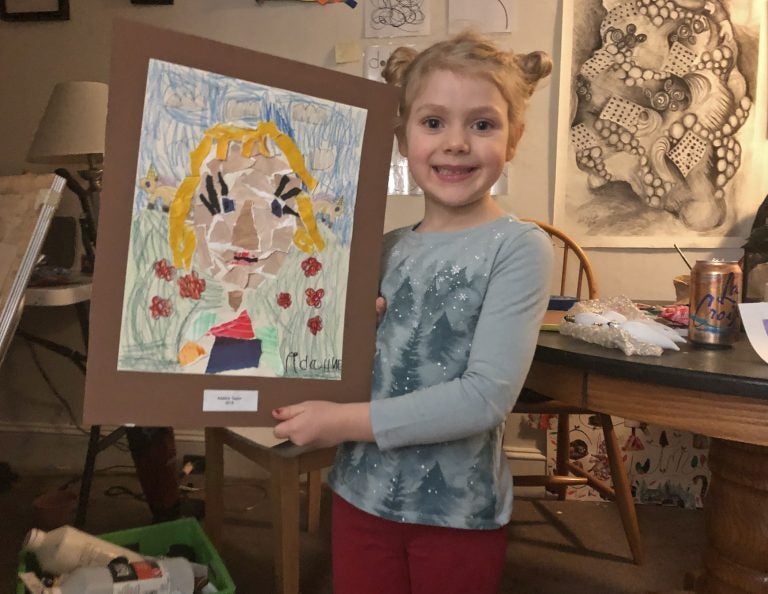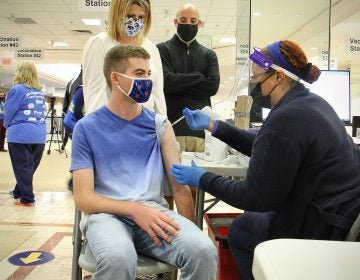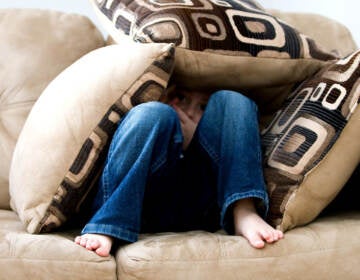Should we call little girls beautiful?
Many parents bristle when people call their daughters beautiful. They worry that it sets girls up for only valuing their looks. For others, it’s not that big of a deal.
Listen 07:01
Adaline Taylor, 6, shows off her artwork. (Christine Fennessy/For WHYY)
Many parents don’t want people to call their daughters “beautiful” or “pretty.”
They say it makes little girls uncomfortable or self-conscious. That it connects their self-worth to their looks. Or that it emphasizes something they don’t have a lot of control over, like appearance, over the things they do, like behavior.
Liz Reap Carlson is one of those parents. She is the mother of 5-year-old Livia, a smart, athletic, and outgoing kid who loves learning about dinosaurs and playing with her new puppy, Raisin. Livia is also a stunning girl. She has big blue eyes, classic features, and the kind of hair you see in magazines.
And her golden ringlets attract a lot of attention.
“People are always saying, ‘That hair! Where do you get those blond locks?’” says Carlson, who lives near Seattle. “Or they say, ‘I wish I had hair like that’, or ‘My goodness you look beautiful today,’ or ‘Hey beautiful.’ It’s just really constant.”
Wherever Livia goes, the comments follow her: to the grocery store, the post office, the pharmacy.
While Carlson’s internal reaction is usually along the lines of: This again? The hair? She always tries to be gracious. She thanks people, and is quick to return the compliment, usually saying something about how much she likes their hair. She knows people are just trying to be friendly. And she’s sensitive to the idea that it may sound to some as if she’s enduring some sort of hardship, fielding her daughter’s compliments all day.
But those compliments worry her.
“I’m at home trying to teach her about how important it is to write and to read and pursue things that she’s curious about, and to be a kind person, and ask questions,” she says. “But what society constantly reinforces is that she looks pretty and her hair is nice.”
It’s tough to know exactly how all the attention affects Livia. Sometimes she’s impatient with it — “Yeah, I know I have blond hair” — and sometimes says Carlson, she shrinks away from it. One thing is for sure, however, Livia does not like getting her hair cut.
“She has learned very early on that it’s an asset, which is not such a bad thing I suppose, but she has learned that when she dresses up she gets a lot more attention. So I do think it has an impact on her. It makes her a lot more aware of her appearance than I would like her to be at this age.”
Carlson recently cut Livia’s nearly waist-length hair. It took two days of negotiating, but Livia is happy with her new bob. And that’s all Carlson wants: a happy, confident kid. She knows what can happen when happiness and confidence rely on appearance. When Carlson was growing up, she, too, got a lot of compliments on her looks. The more attention she paid to her clothes and her hair, the more praise she got.
She came to believe that nothing mattered as much as being pretty. And pretty meant thin — very thin. That mindset contributed to her developing an eating disorder.
“I went into the hospital in college because I was afraid I was going to die,” says Carlson. “You know at that point, I was 19, and I had been actively anorexic or bulimic for seven years.”
Carlson realizes her experience makes her sensitive to what people say to Livia. But she also thinks that focusing on Livia’s appearance sells her kid short, when she has so much more to offer.
“I just wish the conversation would expand, you know what I mean?” To, “Wow! I really like that you have a jungle print on. What’s your favorite color? Is there a jungle animal you love the most? Tell me a little more about what you’re up to. Or, I see you have soccer cleats on, or what grade are you in? You look like you’re about five, what’s a 5-year-old into these days?”
Tomi-Ann Roberts would agree that Carlson has a right to worry. Roberts is a professor of psychology at Colorado College, and she thinks this unchecked commentary on appearance is a huge deal.
“I think the sexual objectification of girls and women, and their self-objectification is basically the primary form of misogyny today,” says Roberts. “I think it’s a way of keeping women and girls in their place. It’s a form of what I would call benevolent sexism, it seems like a positive comment, but it ends up keeping them down and keeping them from their fullest potential.”
Roberts says when girls are constantly praised for things like being beautiful or pretty rather than for their behavior, they can develop what’s called a fixed mindset. They start to believe their value is dependent on their appearance, and so all their time and energy — at the expense of other activities and pursuits — go into maintaining that value.
And if those compliments stop coming, says Roberts, “They can feel like abject failures. And they can really suffer.”
But here’s the thing. Many parents don’t have a problem with such compliments. Some simply delight in the unsolicited praise. Others see it as an opportunity to teach their child how to accept a compliment. Still others say they get it — it’s just too hard to tell if a kid is kind or hard working in the first few seconds of meeting her.
Trisha Samuel gets it. She’s an art teacher, and an artist.
“In the fine art world, I do portraits and my favorite is to do people,” she says. “There’s something really beautiful about looking at someone’s portrait and seeing how extraordinary unique they are.”
Samuel is also the mother of two kids. Adaline is a 6-year-old who loves horses and making art with her mom. Marshall is nearly 3 years old, and loves just about anything with wheels, especially his bike. They’re good looking kids who love to talk, and Samuel is used to strangers noticing — and commenting on — both of them.
“It was interesting to realize that Marshall was getting the same amount of attention,” she says. “And I don’t know, maybe stereotypically I thought only a girl would get those beautiful comments but he gets them just as often.”
She says the comments typically come from older women. And while Trisha fully supports and respects those parents who advocate against calling kids out on their appearance, she’s okay when it happens to her own.
“I understand, and maybe this is from my art background,” she says, “that we are an extraordinarily visual culture. I don’t know if that will ever change. We’re always going to see through aesthetics.”
Samuel knows we’re almost hard-wired to comment on the things we enjoy looking at. And so the comments don’t bother her. Instead, she sees them as an opportunity to interact with people, and potentially have a meaningful exchange with them.
“I think the reason that I don’t get upset is that I just feel like our purpose in life is to connect with each other. So I don’t want to shame people into changing. I want to connect with them and grow together. That’s what I want to do.”
Still, Samuel knows that words like beautiful can be fraught. She remembers the insecurity she felt growing up. The relentless grind of thinking she didn’t look good enough. Of relying too much on what people said about how she looked. So she works hard to explain to Adaline and Marshall that beauty “glows from the inside.”
And so far, Adaline seems to get it. When people tell her she’s beautiful, she thanks them. “I think it’s so nice,” she says. “It’s really fun for me.”
But when they don’t say anything about how she looks?
“Yeah, I kind of just roll with it,” she says. “Because that’s what 6-year-olds do.”
WHYY is your source for fact-based, in-depth journalism and information. As a nonprofit organization, we rely on financial support from readers like you. Please give today.






